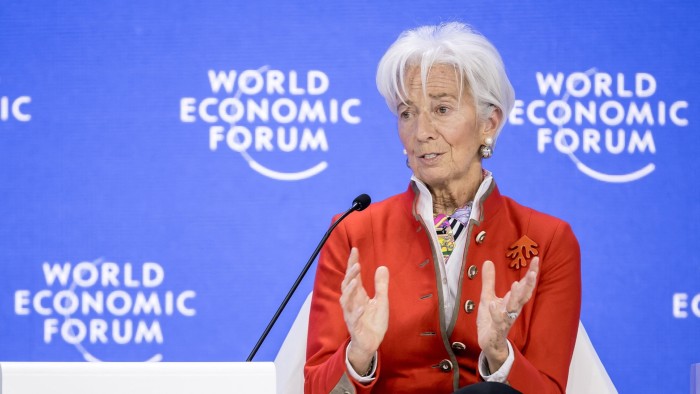Unlock the White House Watch newsletter for free
Your guide to what the 2024 US election means for Washington and the world
Europe may be able to attract disillusioned “talent” from across the Atlantic following Donald Trump’s election, the European Central Bank president has suggested, as she called on the continent to better recognise its economic strengths.
Christine Lagarde said Europe needed to get better at keeping its talent and savings at home, adding that the new US administration’s decision to freeze some funding for former president Joe Biden’s Inflation Reduction Act might remove one of the incentives to invest in the US.
Without making a direct reference to Trump, the French central banker indicated that some US residents might be attracted to Europe in the wake of the US inauguration.
“We need to keep the talent at home. We need to keep the savings at home. Maybe it is also time to import a few of the talents that would be disenchanted, for one reason or the other, from another side of the sea,” she said.
Trump’s re-election has led some US citizens and residents to consider leaving the country, with lawyers in the UK reporting an influx of interest from liberal Americans in relocating.
Lagarde’s words came on the closing day of the World Economic Forum in Davos, during which investors and executives highlighted the contrast between the upbeat mood about the US economy and deep pessimism about Europe’s weak growth prospects.
Speaking alongside Lagarde on a panel, Larry Fink, chief executive of BlackRock, said he believed that there was too much pessimism in Europe and it was probably time to be investing back into the continent.
Lagarde said that the EU faced “existential threats” but that this should act as a wake-up call for its leaders to take action to strengthen the bloc.
She said the positive scorecard for the Eurozone included a relatively low overall government deficit at about 3 per cent of GDP, and her “strong confidence” that annual inflation, which was 2.4 per cent in December, was more likely to decline than to reaccelerate.
Lagarde acknowledged that some executives were “not very upbeat” about European prospects, but she argued the continent could respond to its economic challenges if its leaders “actually get their act together”.
Among the changes that could benefit Europe are Trump’s decision to suspend the disbursement of some funds under the Inflation Reduction Act, which has served as an important lure for European companies seeking to set up manufacturing projects in the US.
Andy Marsh, chief executive of Plug Power — a US clean hydrogen developer and parts manufacturer that secured a $1.66bn loan from the Department of Energy Loan Programs Office in the final hours of the Biden administration — warned that a prolonged pause in clean tech funding would force companies to move investments elsewhere.
“We’re going to go where there’s markets,” said Marsh. “If there’s more interest for our products because of policy in Europe and Australia, we’ll spend more time in Europe and Australia. I think that would be the approach most companies would take.”
Despite an expected slowdown in investments in green tech, economists believe the US remains a more attractive destination for investors’ capital than Europe.
“You’ve got a relative growth story in the US, you’ve got subsidised or cheap energy for heavy industry, and you’ve got direct pressures on Europe — and a few other places — from Trump saying that to sell in America, companies will have to produce here,” said Adam Posen, director of the Peterson Institute for International Economics think-tank.
“Irrespective of anything, you’re going to have a huge surge of foreign direct investment [in the US] over the next year or two.”
European politicians in Davos have also been arguing that Trump’s vows to erect trade barriers open an opportunity for the EU to strengthen its ties with other countries around the world. Lagarde said that the Europeans had learnt after the second world war that “you cannot go alone” and they instead needed to sit at the table and co-operate.
She said: “What is happening outside Is a challenge but also a big opportunity for revisiting and deciding whether or not Europe wants to be a key player,” Lagarde said. “I am contending it has the talent, and it has the means and it has the ambition.”
Fink, despite his optimism that the investment case for Europe had grown, said Europe was a “myth” because the single market was incomplete, including in financial services.
Lagarde disagreed. “Europe is not a myth. It is not a basket case. It’s a fantastic case for transformation.”
Read the full article here




